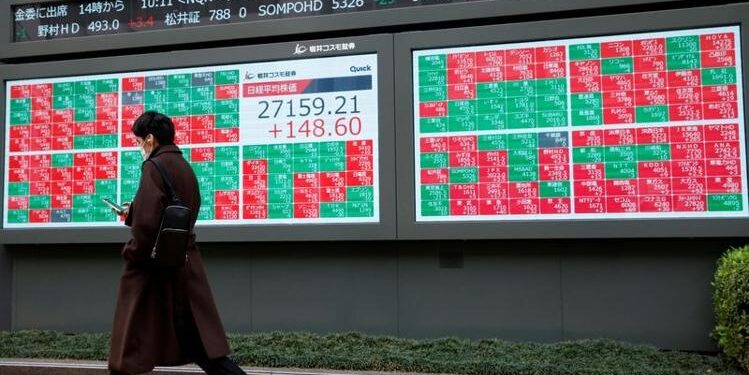Asian markets started a likely momentous month on the cautious side, with shares mostly lower and Treasury yields near three-month highs on Friday, while investors wait for U.S. payrolls data, although a rate cut next week is largely baked in.
Investors are awaiting Friday’s nonfarm payrolls report, ahead of Tuesday’s U.S. presidential election and Federal Reserve’s policy meeting a day later.
Oil extended its rally, with Brent prices up almost 2% to $74.13 a barrel, on reports that Iran was preparing a retaliatory strike on Israel from Iraqi territory in the coming days.
After a sell-off overnight, Nasdaq futures rose 0.3% thanks to a 5.3% jump in Amazon (AMZN.O), opens new tab after the bell, which added $104 billion in its market cap.
The tech giant posted third-quarter profit above Wall Street estimates, helped by favourable retail sales.
The embattled Intel (INTC.O), opens new tab also surprised with upbeat revenue projections, sending its shares up 7% after the close.
In Asia, MSCI’s broadest index of Asia-Pacific shares outside Japan (.MIAPJ0000PUS), opens new tab slipped 0.3% and was down 1.9% for the week.
Tokyo’s Nikkei (.N225), opens new tab fell 2.1% as a stronger yen clouded the outlook for Japanese exporters.
The yen held at 152.06 per dollar, having rallied about 1% overnight as less dovish comments from the Bank of Japan Governor Kazuo Ueda kept the door open for a year-end rate hike.
China’s blue chips (.CSI300), opens new tab inched 0.1% higher while Hong Kong’s Hang Seng index (.HSI), opens new tab rose 0.4% after a private survey showed China’s factory activity returned to expansion in October.
Overnight, shares of Facebook owner Meta Platforms (META.O), opens new tab fell 4% and Microsoft (MSFT.O), opens new tab sank 6%, despite both companies beating earnings estimates.
Investors were concerned that growing artificial intelligence could hit their profits.
Barring a major surprise in the U.S. payrolls report, a quarter-point rate cut by the Fed is 94% priced in after data showed U.S. consumption remained healthy and inflation gauges point to abating price pressures.
Economists expect the U.S. economy added 113,000 jobs in October, although risks are skewed to the upside given the private sector survey pointed to strong job gains and jobless claims were lower than expected.
Goldman Sachs, however, expect just 95,000 new jobs in October, while TD Securities also forecast just a 70,000 increase.
“Hurricanes and the Boeing strike are the name of the game in October, and we expect this combination of shocks to heavily distort this month’s jobs figures. Underlying this, though, high-frequency data was already pointing to a slower month of hiring than September,” analysts at TD Securities said in a note.
ALSO READ:Mpox Not Under Control, Spreading Rapidly, Africa CDC Warns
In the foreign exchange market, the pound was pinned near 2-1/2 month lows of $1.2891 and British bond yields jumped as investors judged the UK government’s new budget would boost inflation and cause the Bank of England to cut interest rates more slowly.
Treasury yields hovered near three-month highs. The two-year yields have risen 7 basis points this week to 4.1702%, just a touch below their three-month high of 4.2180%, while the benchmark 10-year yields are up 5 basis points this week to 4.2840%.
Gold prices took a 1.5% tumble overnight and was last steady at $2,745.69 an ounce. Reuters.













